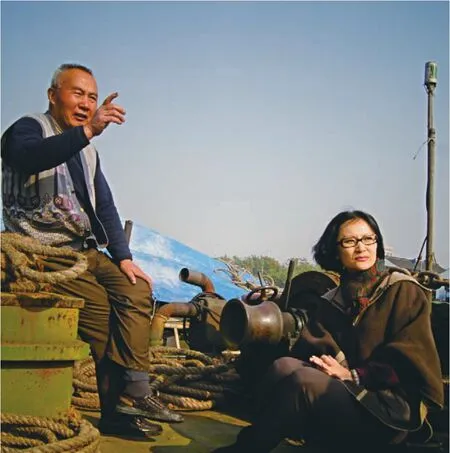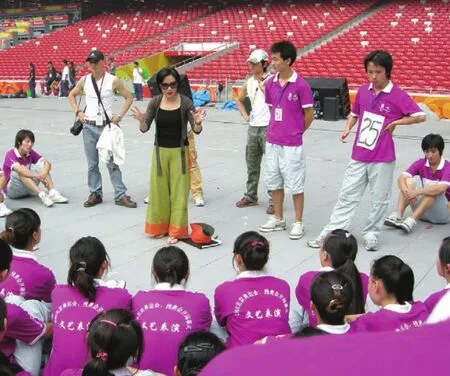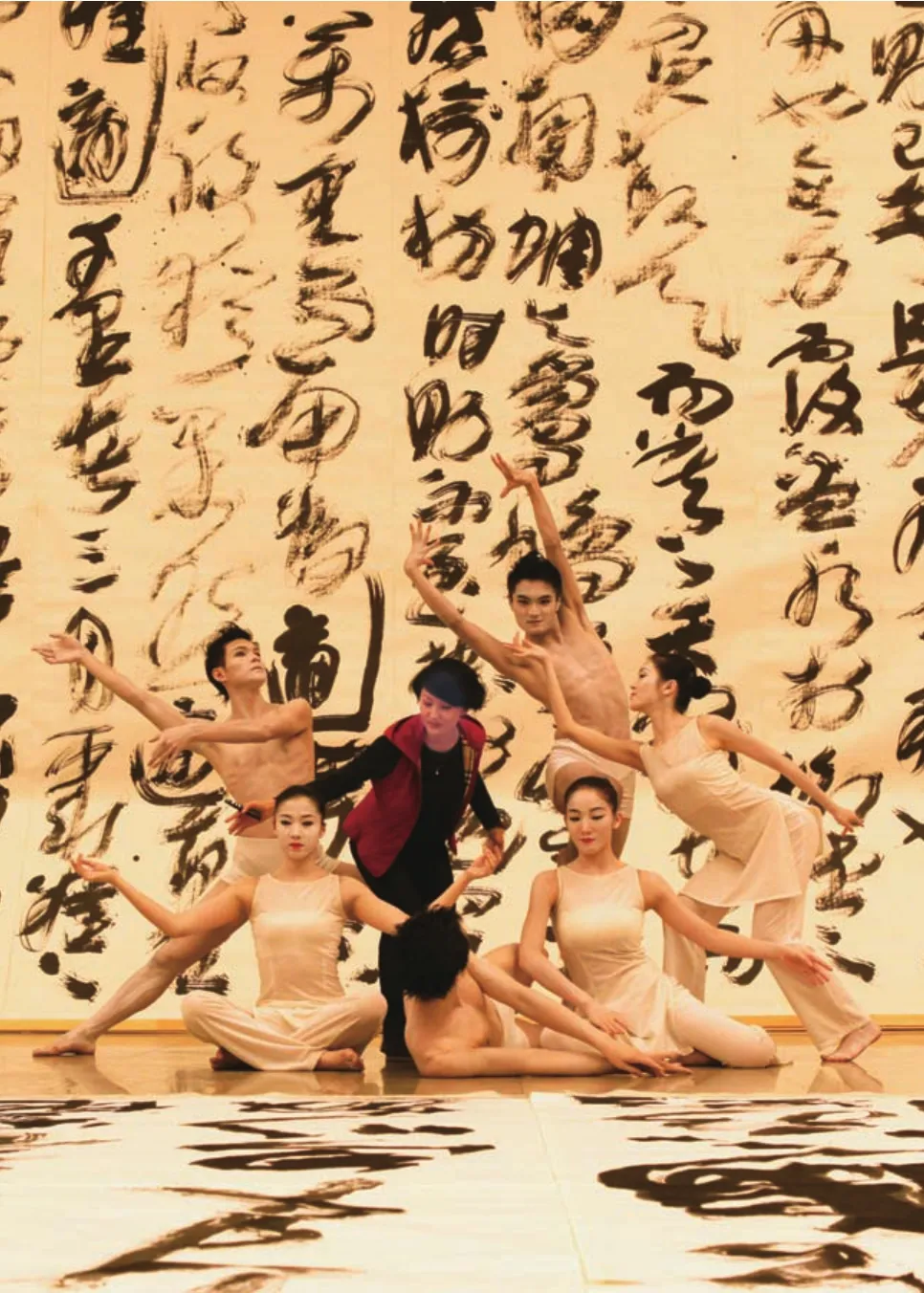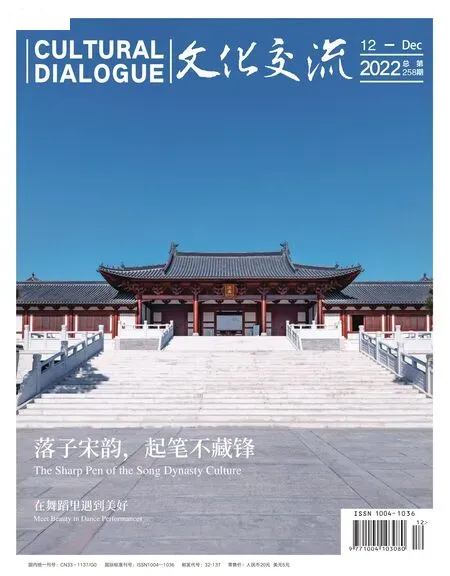在舞蹈里遇见美好
——专访杭州歌剧舞剧院院长崔巍
文/肖艳艳 杨广夏
钱塘江畔,桂香阵阵,歌声悠扬。在杭州钱塘江畔的一个排练场,我们见到了崔巍。她一头干净利落的短发,有着江南女子温婉的气质,交谈中却能让人感受到骨子里透着山东大嫚(姑娘)的飒爽。
与这个排练场隔江相望的,是杭州奥体中心体育场,俗称“大莲花”。2023年,杭州亚运会开幕式将在这里举行。作为开幕式副总导演,每次遥望对岸,崔巍的双眸都闪着光。
6岁开始跳舞,到如今成为杭州歌剧舞剧院院长,崔巍说自己一辈子只专注做一件事,那就是舞蹈。从一而终,崔巍对事业如此,对杭州也是如此。
1984年,18岁的崔巍从北京舞蹈学院表演系毕业,被分配到杭州歌舞团。这位青岛姑娘在这座城市一待就是30多年,并从此开启了一段传奇之旅。
遇见杭州
1982年,杭州成为全国首批历史文化名城。
为打造好这张“金名片”,杭州求贤若渴。
两年后,杭州市领导亲自带队去北京舞蹈学院“要人才”,崔巍因此受到青睐。从此,她的人生便与杭州这座城市结下了不解之缘。从演员到编导,她对艺术和舞蹈的理解,在江南充满诗意的空气里舒展。
一部《阿姐鼓》让崔巍展露锋芒,一举拿下中国舞台艺术最高奖—文华奖。
这是崔巍学习编导之后的第一部作品。很多人都知道这是一部讲述藏族人民热爱生命、崇尚自然且具有生生不灭之顽强精神的艺术作品,却很少有人了解这段舞蹈的灵感,来自几个藏族孩子的舞步。

崔巍。Cui Wei.
为了创作《阿姐鼓》,崔巍克服严重高反,四进西藏采风,还曾到达珠峰大本营。

为创作《遇见大运河》,崔巍到运河沿岸采风。Cui Wei travels along the Grand Canal for the production of To Meet the Grand Canal.
“采风不是简单地学两个动作,而是要深入体验,寻找触动心灵的情感共鸣。”在崔巍看来,艺术不是高高在上的,它离我们很近。生活是艺术的创作源泉,人民是艺术家的母亲。
2004年,在创作《与外乡人一起跳舞》时,崔巍特意把演出舞台放在工地现场,演员与建筑工人一起共舞。
“当时工地附近有家小面馆,大家干完活都去那里吃饭。我看到一个小伙子,只吃一碗清汤面,什么都舍不得加。”同为外乡人的崔巍,懂得背井离乡的辛苦与不易,让老板娘给小伙子加了个煎蛋、一块大排。
“当时他腾地一下站起来。我说没有关系,是我送你的。他看着我说,下次我还能看到你们的舞蹈吗?”讲到这里,崔巍眼中泪光闪烁,“劳动者是最辛苦的,他们需要得到社会关注,这也是我做这个作品的原因。”演出当天,很多人流着泪看完表演,结束了也不愿走。
这些年来,在崔巍的带领下,杭歌演员把杭城火车站、地铁站、飞机场、长途汽车站、敬老院、城市中心广场等当作舞台,把歌声与微笑带给了更多人。
遇见大运河
2008年北京奥运会之后,结束工作的崔巍回到杭州,得知大运河正在申遗的消息。
当时,杭歌与大运河只有一路之隔。望着流淌千年的河水,她感到有一股生生不息的力量在涌动,总觉得自己应该为运河做点什么。
经过一年的酝酿,崔巍决定以中国大运河为题材,创作一个舞剧。
怀着满腔热情搞创作的她,很快就遇到了创作难题。中国大运河是世界上最长、工程最大的运河,也是最古老的运河之一,承载着中国的千年底蕴,用60集的电视剧也难以说清道明,只有一个半小时的舞蹈该如何呈现?
3年时间,崔巍带着团队几乎走遍运河沿岸的所有城市。他们拜访研究运河的历史学者,和船民唠家常;听沿岸各种戏曲,快板、越剧、评弹;看各地不同形式的运河文化,绘画、刺绣、雕塑、博物馆……她认为,作品必须既提炼出精神内核,又让观众耳目一新,通俗易懂。
“终于有一天,我找到了切入点。水滴汇聚成运河,女主角就是那滴水,代表运河的千年历史;男主角是创作《遇见大运河》的艺术家,代表现在的我们。”崔巍兴奋地说,男女主角的相知相爱,实际上是我们与运河、与历史、与文化遗产之间的大爱。
2017年,这滴东方之水从中国一路流淌到法国、埃及、巴拿马等十个运河国家,架起文化的桥梁,向世界讲述中国的历史,中国的故事。
在法国巡演时,一位观众泪流满面,她被故事深深打动,说要到中国亲眼看看中国大运河。在希腊演出时,一位史学家的发言让崔巍很有共鸣。他说:“中国有两大人工奇迹,一是长城,一是运河,长城代表着中国的过去,它是坚硬的、封闭的、防御的;大运河代表中国的今天,是开放的、流通的、交融的。”
舞蹈的力量,跨越国界和语言。诸多身份中,崔巍最喜欢把自己定义为文化传播者。“要讲好中国故事,我觉得融合非常重要。要用舞蹈这一人类共同的语言,与各国观众产生共鸣。”每到一个城市,崔巍都会在当地最著名的地方举办快闪活动,还要根据当地的风俗、审美习惯等因素,有针对性地选择演出及文化交流的内容。
遇见盛会
在杭州30多年,崔巍完成了艺术生命的蜕变—从一名舞蹈演员转型为优秀导演,从在杭州汲取“养分”,到用创作回馈这座城市。
2008年北京奥运会,是崔巍的第一次蜕变。如何让世界重新认识中国?如何展现“同一个世界,同一个梦想”?当时,主创团队为此费尽苦心。
当《我和你》在奥运会场上响起时,崔巍突然悟出,从容坦然亦是一种文化自信,不一定非要敲锣打鼓。
8年后,G20杭州峰会文艺晚会《最忆是杭州》上演,美轮美奂的中国意境惊艳世界,融合共处的美好愿景得到认同。“祖国的强盛和软实力的提升,让人们发自内心地产生文化自豪感,这让我们充分感受到时代发展所赋予人民的从容与自信。”崔巍说。
“艺术最重要的是传递精神。2023年亚运会,我们不仅要表达杭州,更要表达现在的中国,尤其是人们那种幸福、自在、坦然的生活状态和精神面貌。”为了明年能交上一份精彩的作业,崔巍和主创团队不断打磨,寻找新的突破。
采访结束,崔巍又匆匆赶回排练场地。在艺术这条道路上,崔巍不断向前:在努力中,遇见更好的自己。

崔巍带领团队创作的舞蹈剧《遇见大运河》在法国巡演。The dancing troupe of To Meet the Grand Canal, directed by Cui Wei, takes a performance tour in France.
Meet Beauty in Dance Performances
By Xiao Yanyan Yang Guangxia
On the banks of the Qiantang River with the sweet fragrance of osmanthus spreading, we meet Cui Wei in a rehearsal hall.Wearing clean short hair, she possesses the same tenderness as aJiangnan(south of the Yangtze River) woman, but her speech reveals the sassiness of a Shandong girl by heart. Starting dancing at the age of 6 and now the president of Hangzhou Opera &Dance Drama Theater, Cui Wei says that she has simply focused on one thing in her life, that is, dance.
Across the river from this rehearsal hall stands the Hangzhou Olympic Sports Center Stadium, commonly known as “Big Lotus”. In 2023, the opening ceremony of the Hangzhou Asian Games 2022 will be held there. As the chief assistant director of the ceremony, Cui Wei has her eyes shining every time she looks at the other side.
In 1982, Hangzhou was listed among the first batch of national famous historical and cultural cities in China. To build up this cultural name card, in 1984, the local government sent a team to Beijing Dance Academy in pursuit of talents, and Cui Wei, a girl from Qingdao, East China’s Shandong province, was among those selected. Since then, her life has been indissolubly bound with Hangzhou. In the poetic atmosphere ofJiangnan, Cui, first as an actor and then as a choreographer, expanded her understanding of art and dance in depth.
In 1996, Cui Wei, the then novice choreographer, won the Wenhua Grand Award, the highest award in Chinese stage art,with the dance dramaSister Drum. Though it is widely known that the work praises the love of life, of nature and tenacity of Tibetan people, it is far less known that it was inspired by dance steps of several Tibetan children. To create Sister Drum, Cui Wei traveled to Tibet four times to study local folk dances and even reached the base camp of Mount Qomolongma. “Folk dance collecting means not simply to copy a few movements, but to experience deeply and find the emotional resonance that touches the soul.” In Cui Wei’s eyes, art should not be something high above the ordinary people because life is the source of artistic creation and the people the muse of artists.
In 2004, when working forDancing with Out-of-Towners,Cui Wei deliberately moved her stage to a construction site where actors and builders danced together. “I remember a small noodle restaurant near the construction site, and the builders went there for food after work. There was a young man who only ate a bowl of plain noodles without adding anything,” Cui says. “Workers are the most hardworking who need social attention. That’s why I created this dance drama.” Over the years, under the leadership of Cui Wei, the actors of Hangzhou Opera & Drama Dance Theater have staged performances at Hangzhou railway stations, metro stations, airport, coach stations, nursing homes, city center square and other public spaces, bringing music and laughter to many.
In 2008, having returned to Hangzhou after finishing her work at the Beijing Summer Olympics, Cui Wei learned of China’s application for the Grand Canal to be inscribed as a world cultural heritage. At that time, Hangzhou Opera & Drama Dance Theater was only one street away from the Grand Canal. Looking at the river flowing for thousands of years, feeling urged to do something for it, she decided on a dance drama with the theme of the Grand Canal. Yet almost instantly she encountered difficulties. The Grand Canal is the longest and most engineered canal in the world, and one of the oldest. How can a dance drama of only one and a half hours show its millennium-old heritage?

2008 年,崔巍对参加北京奥运会开幕式的演员进行指导。Cui Wei instructs performers taking part in the opening ceremony of the 2008 Beijing Olympic Games.
In three years, Cui Wei led a team to almost all the cities along the Grand Canal, visiting historians, chatting with boat people, listening to various operas, comic talks and ballad singing along the banks, seeing different forms of canal culture in various places such as painting, embroidery, sculpture ... Cui Wei believes that the work must not only condense the spiritual core but be easy to understand, and be refreshing to the audience. “Finally one day, I found the breakthrough point. As it is water droplets that converge into the canal, I decided to let the heroine be that drop of water, representing the millennium history of the canal. The hero is the artist who wrought the dance drama, representing us at present.” The heroine and hero meet and fall in love with each other, embodying the great love between us and the Grand Canal,its history, and its heritage.
In 2017,To Meet the Grand Canal, as a drop of oriental water, flowed from China to ten canal countries around the world,including France, Egypt and Panama, building a bridge of cultural exchanges and telling the world the history and stories of China.During the French tour, a spectator was so moved by the story that she shed tears, saying that she would go to China to visit the Grand Canal in person. When performing in Greece, Cui Wei resonated deeply with a historian’s words, “There are two man-made miracles in China. One is the Great Wall and the other is the Grand Canal.The Great Wall represents China’s past, which is hard, closed, and defensive. The Grand Canal represents China today, which is open,fluid, and integrating.” The power of dance transcends national boundaries and languages. Among her many identities, Cui Wei likes to define herself as a cultural communicator the most. “We must use dance, the common language of mankind, to resonate with audiences from all over the world.”
For more than 30 years in Hangzhou, Cui Wei has completed the transformation of her artistic life from a dancer to an excellent director. The 2008 Beijing Summer Olympic Games witnessed her first transformation. When the theme song You and Me sounded on the Olympic field, many people could not accept such an artistic expression, feeling that it was not high-spirited enough.However, in Cui’s view, being calm and undisturbed is also a manifestation of cultural self-confidence, which doesn’t have to be celebrated by gongs and drums. Eight years later, at the G20 Hangzhou Summit in 2016 was stagedEnduring Memories of Hangzhou, whose magnificence amazed the world with the vision of global integration and coexistence widely recognized. “The prosperity of our motherland and the improvement of soft power have given people a sense of cultural confidence from the bottom of their hearts,” Cui says.

崔巍指导演员们表演。Cui Wei instructs dancers.
“The most important thing about art is to convey the spirit.In the Asian Games next year, we will not only express the spirit of Hangzhou but that of current China, especially the blissful, relaxed lifestyles and the ethos of our people.” After the interview, Cui Wei hurries back to the rehearsal venue, and with the creative team, she will continue to polish their work, looking for breakthroughs. On the road of art, Cui Wei keeps moving forward, and in the process of hard work, she meets a better self.
Cui Wei is currently president of Zhejiang Dancers Association, president of Hangzhou Opera & Dance DramaTheater, and assistant director of the Opening Ceremonies of the 2008 Beijing Olympic Games and the 2022 Hangzhou Asian Games.

